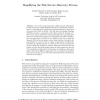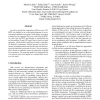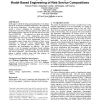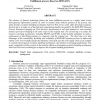FASE
2008
Springer
14 years 2 months ago
2008
Springer
Web services are open, interoperable, easy to integrate and reuse, and are extensively used in many application domains. Research and best practices have produced excellent support...
ESWS
2008
Springer
14 years 2 months ago
2008
Springer
One of the crucial reasons for adding semantic descriptions to Web services is to enable intelligent discovery, removing the need for a human to manually search and browse textual ...
ESWS
2008
Springer
14 years 2 months ago
2008
Springer
Geospatial Web services allow to access and to process Geospatial data. Despite significant standardisation efforts, severe heterogeneity and interoperability problems remain. The ...
ESWS
2008
Springer
14 years 2 months ago
2008
Springer
With currently available tools and languages, translating between an existing XML format and RDF is a tedious and error-prone task. The importance of this problem is acknowledged b...
ECOWS
2008
Springer
14 years 2 months ago
2008
Springer
In order to specify the composition of Web services, WSBPEL was defined as an orchestrating language by an international standards consortium. In this paper, we propose a method t...
EUROMICRO
2007
IEEE
14 years 2 months ago
2007
IEEE
BPEL is a de-facto standard language for web service orchestration. It is a challenge to test BPEL processes automatically because of the complex features of the language. The cur...
AOSD
2007
ACM
14 years 2 months ago
2007
ACM
Composing web services using current web service composition languages (such as BPEL) requires a large amount of in-depth knowledge. This paper introduces a service creation envir...
ECLIPSE
2005
ACM
14 years 2 months ago
2005
ACM
In this paper we detail the design and implementation of an Eclipse plug-in for an integrated, model-based approach, to the engineering of web service compositions. The plug-in al...
ECOWS
2006
Springer
14 years 2 months ago
2006
Springer
The automated composition of Web services is one of the most promising ideas and at the same time one of the most challenging research area for the taking off of serviceoriented a...
ACMICEC
2005
ACM
14 years 2 months ago
2005
ACM
The advance of Internet technology fosters the order fulfillment process in a supply chain across heterogeneous information systems. In order to monitor states between partners in...




